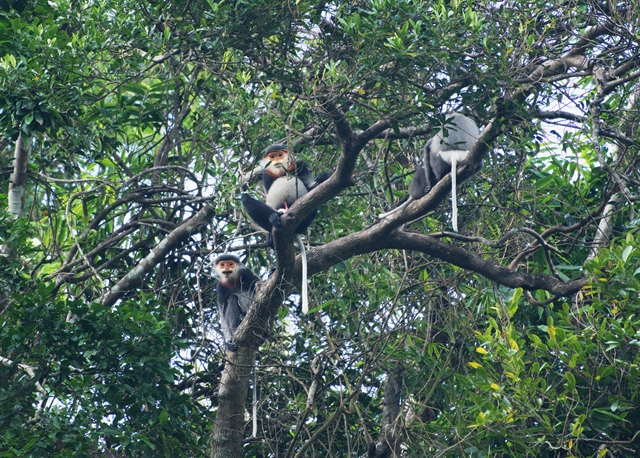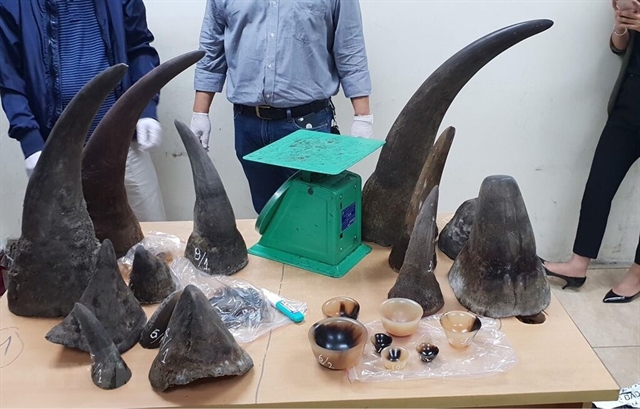 Environment
Environment

 |
| Rhino horns seized by the police during a raid in 2020 The trader was sentenced to five years in prison. — VNA/VNS Photo |
HÀ NỘI — Wildlife trafficking in Việt Nam has grown increasingly sophisticated and harder to detect in recent years as traders shift their operations to digital platforms.
According to a Wildlife Trade Monitoring Network's (TRAFFIC) report, Việt Nam recorded approximately 22,500 online advertisements for wildlife and wildlife products from June 2021 to July 2023.
Facebook dominates as the primary platform, accounting for 51.3 per cent of the activity, followed by Zalo at 35.5 per cent.
Other platforms, including TikTok (2.2 per cent), YouTube (0.7 per cent), and e-commerce sites like Shopee, Lazada, and Sendo, were also implicated, though to a lesser extent.
Demand remains high for critically endangered species, with items such as elephant ivory, tiger fangs, rhino horns, and pangolin scales, listed under Việt Nam’s protected Red Book species, frequently traded online despite strict bans.
Additionally, otters, pythons and monitor lizards are sold as exotic pets, while bushmeat from species like deer, cobras and porcupines caters to culinary preferences.
Nguyễn Thị Phương Dung, Deputy Director of the Education for Nature Vietnam (ENV), said violations linked to online wildlife trade surged over the past decade.
"In 2015, these violations accounted for about 21 per cent of recorded wildlife trafficking cases, but in recent years, they’ve exceeded 50 per cent," she said.
She added that ENV’s hotline received around nine reports daily, mostly related to wildlife sales on Facebook, Zalo and other online platforms.
Traffickers employ increasingly cunning tactics to evade authorities and platform moderation, according to reports.
Many use fake or anonymous accounts and rely on coded language, such as 'chocolate 30' for tiger bone glue or 'lean meat' for rhino horn, to bypass content filters. After identifying buyers, sellers shift to private messaging or phone calls and delete posts to erase evidence, complicating enforcement efforts.
Some disguise their intent by sharing videos of animals like big-headed turtles or otters, claiming it is for entertainment, only to direct interested buyers to secret groups for price negotiations and delivery arrangements. When confronted by authorities, they often argue the posts were for 'fun' or engagement, not sales.
“Social media platforms and law enforcement should formalise their cooperation to strengthen detection and investigation efforts,” said Bùi Thúy Nga, Senior Programme Manager at TRAFFIC Vietnam, noting these improvements would enable agencies to build stronger criminal cases that could lead to prosecutions.
While the trade thrives in the virtual world, its consequences are starkly real, threatening Việt Nam’s biodiversity and environment.
Overhunting for the black market is pushing species like elephants, tigers, and rhinos toward total extinction. Endemic species, including golden-fronted box turtles, Cát Bà langurs and king cobras, are also dwindling due to trafficking.
Beyond biodiversity loss, the illegal trade poses public health risks. The transport and confinement of diverse species in unsanitary conditions create breeding grounds for viruses and bacteria, raising the spectre of zoonotic diseases.
Invasive alien species, sometimes released or escaped, further threaten native ecosystems by competing for resources or introducing pathogens.
The economic toll is equally significant, with ecotourism suffering as rare wildlife disappears and Việt Nam’s reputation tarnished if labelled as a global trafficking hotspot.
Việt Nam’s government has ramped up efforts to curb the trade, issuing Directive 29/CT-TTg to crack down on illegal wildlife advertising and sales online.
In 2024, authorities prosecuted 180 wildlife-related cases, arresting 166 individuals with average prison sentences of 3.5 years.
In a notable case, HCM City’s court sentenced Vưu Ngọc Thái, 33, to two years in prison and fined him VNĐ50 million ($2,000) for illegally trading three endangered big-headed turtles.
Thái was caught delivering the turtles to an anonymous buyer via Zalo for VNĐ3.6 million ($145). He admitted to purchasing them from another anonymous seller on the same platform.
Experts say stronger laws and enforcement alone will not suffice. They urge authorities to collaborate with tech companies by sharing blacklists and keywords to detect illegal content faster.
Tech firms, in turn, must proactively remove violating posts and block transactions, while AI tools could help scan for sensitive images and terms.
Reducing consumer demand is also critical. "If there are no buyers, the market will shrink," said Dung, calling for public awareness campaigns on the trade’s devastating impacts.
Lưu Hoài Bảo, a criminal law expert at Hanoi Law University, advocated for a dedicated wildlife protection law.
"Fifty-six countries, including China, have such laws, enabling consistent prevention and prosecution of wildlife crimes," he said.
"Việt Nam needs this to safeguard its natural heritage."
As the trade evolves, so too must the response, or Việt Nam risks losing its wildlife, and much more, to the shadows of the internet. — VNS




